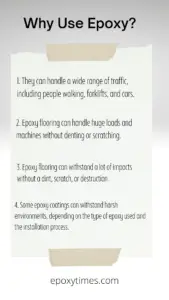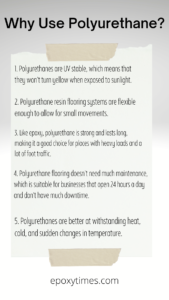Epoxy Vs Polyurethane
Epoxy and polyurethane are two of the most widely used finishes for concrete flooring in the construction world. These two coatings are long-lasting because they are resistant to chemicals and acids, easy to clean, and good-looking.
Even though polyurethane and epoxy are often used interchangeably, they are two different kinds of coatings, each with its properties and benefits.
Knowing how each is different from the other will give you an understanding of which one best fits your goal. So, read on if you want to learn more about epoxy and polyurethane to help with your decision-making.
What is Epoxy?
Known as a type of polymer, epoxy is made from epoxy resin and polyamine that hardens when heated. It is made up of a group of chemical compounds with large molecules of subunits that are recurring in nature, making the resulting epoxy strong and flexible.
Epoxies are very easy to use, come in different thicknesses, and give you a durable and solid floor. One good thing about epoxies is that they can be made with varying VOC levels.
Epoxy coating is excellent for finishing floors because of its strong bonding ability. It can also be used to resurface old or worn-down concrete and to fix cracks, pits, and other damage on the surface of concrete floors.
Why Use Epoxy?
Epoxy flooring forms a strong bond with the concrete below. This bond makes a seamless, durable floor much stronger than plain concrete. Some benefits of epoxy floors include the following:

What is Polyurethane?
Polyurethane, also called PUR and PU, is a type of polymer made up of organic units linked together by carbamate (urethane) links. There are two main kinds of polyurethane on the market: water-based and solvent- or oil-based.
Water-based polyurethane can be combined with water and used to seal the wood. On the other hand, you can thin oil-based polyurethane with solvents like mineral spirits, depending on the project’s needs.
Polyurethanes are stable, can handle high temperatures, and wear very well. It can also be found in varying ranges of sheen levels from satin to high gloss, semi-gloss and matte.
Why Use Polyurethane?

Epoxy and Polyurethane: How Do They Compare?
With a basic eye test, you might need help telling the difference between epoxies and polyurethane. But they are notably different and have different uses based on their purpose and application.
How do you decide between these two options based on your goal? How is one superior to the other, and what do you like more about the one you choose? These differences between epoxy and polyurethane will help you answer those questions.
| Features | Polyurethane | Epoxy |
|---|---|---|
| Abrasion resistance | Highly resistant | Resistant |
| Humidity and moisture resistance | Sensitive | Resistant |
| Tolerance to temperature changes | Very tolerant | Less tolerant |
| UV Resistance | Less resistant | Highly resistant |
| Durability | Very durable | Very durable |
| Chemical Resistance | Resistant | More resistant |
| Cure time | 3 days | 7 days |
| Smell | Awful odor | No odor |
What is the Price Difference Between Epoxy and Polyurethane?
Usually, polyurethane costs a little more than epoxy. Even though prices vary by brand and formula, epoxy is usually a cheaper alternative.
Based on policies surrounding their products, some companies will inflate the epoxy price slightly more than the average market rate. So most of the time, the difference in price between polyurethane and epoxy will be minimal.
Still, price shouldn’t be the only thing you think about when deciding between polyurethane and epoxy for your project.
Epoxy Vs Polyurethane: Sheen level
Most of the time, epoxy resin creates dull surfaces that need to be polished to make them shine. So, if you want an epoxy floor coating to be shiny, you will have to do more work.
Since epoxy is naturally dull, it is best to use it in places where a matte finish is desired. For epoxy surfaces to have a high gloss sheen, you may need extra tools and a step in the finishing process.
There are many different levels of sheen for polyurethane. You can pick the “high gloss” option to get a shiny finish without polishing it.
Conclusion
From the above comparisons of polyurethane and epoxy, it’s clear that each has its pros and cons for different projects.
Although they are both used for coating, they have differences and are suitable for various purposes. Therefore, the application determines the best fit as they serve different purposes.
So, to achieve maximum results from your job, you should figure out which adhesives make the biggest difference.

